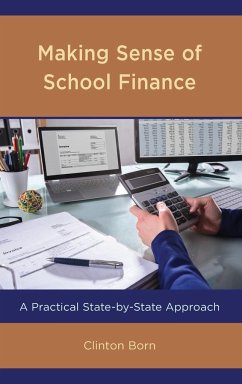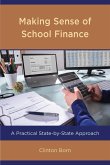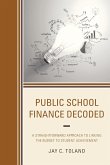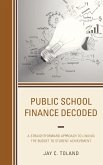- Gebundenes Buch
- Merkliste
- Auf die Merkliste
- Bewerten Bewerten
- Teilen
- Produkt teilen
- Produkterinnerung
- Produkterinnerung
Making Sense of School Finance: A Practical State-by-State Approach thoroughly and clearly describes complex school finance concepts regarding local, state, and federal revenue along with authentic accounting processes in a straightforward manner for public, nonpublic, and charter school leaders.
Andere Kunden interessierten sich auch für
![Making Sense of School Finance Making Sense of School Finance]() Clinton BornMaking Sense of School Finance46,99 €
Clinton BornMaking Sense of School Finance46,99 €![School Bond Success School Bond Success]() Carleton R. HoltSchool Bond Success63,99 €
Carleton R. HoltSchool Bond Success63,99 €![School Bond Success School Bond Success]() Carleton R. HoltSchool Bond Success117,99 €
Carleton R. HoltSchool Bond Success117,99 €![The Essentials of Finance for School Leaders The Essentials of Finance for School Leaders]() Tyrone BynoeThe Essentials of Finance for School Leaders43,99 €
Tyrone BynoeThe Essentials of Finance for School Leaders43,99 €![Public School Finance Decoded Public School Finance Decoded]() Jay C. TolandPublic School Finance Decoded39,99 €
Jay C. TolandPublic School Finance Decoded39,99 €![Public School Finance Decoded Public School Finance Decoded]() Jay C. TolandPublic School Finance Decoded68,99 €
Jay C. TolandPublic School Finance Decoded68,99 €![The Essentials of Finance for School Leaders The Essentials of Finance for School Leaders]() Tyrone BynoeThe Essentials of Finance for School Leaders113,99 €
Tyrone BynoeThe Essentials of Finance for School Leaders113,99 €-
-
-
Making Sense of School Finance: A Practical State-by-State Approach thoroughly and clearly describes complex school finance concepts regarding local, state, and federal revenue along with authentic accounting processes in a straightforward manner for public, nonpublic, and charter school leaders.
Hinweis: Dieser Artikel kann nur an eine deutsche Lieferadresse ausgeliefert werden.
Hinweis: Dieser Artikel kann nur an eine deutsche Lieferadresse ausgeliefert werden.
Produktdetails
- Produktdetails
- Verlag: Rowman & Littlefield Publishers
- Seitenzahl: 180
- Erscheinungstermin: 31. März 2020
- Englisch
- Abmessung: 235mm x 157mm x 14mm
- Gewicht: 420g
- ISBN-13: 9781475856651
- ISBN-10: 1475856652
- Artikelnr.: 58410870
- Herstellerkennzeichnung
- Libri GmbH
- Europaallee 1
- 36244 Bad Hersfeld
- gpsr@libri.de
- Verlag: Rowman & Littlefield Publishers
- Seitenzahl: 180
- Erscheinungstermin: 31. März 2020
- Englisch
- Abmessung: 235mm x 157mm x 14mm
- Gewicht: 420g
- ISBN-13: 9781475856651
- ISBN-10: 1475856652
- Artikelnr.: 58410870
- Herstellerkennzeichnung
- Libri GmbH
- Europaallee 1
- 36244 Bad Hersfeld
- gpsr@libri.de
Dr. Clinton Born is an educational practitioner with a distinguished career in public schools where he served as a Superintendent of Schools, Principal, Assistant Principal, Guidance Counselor, and Teacher. He also served as a Professor in the Graduate Education Program at Franciscan University of Steubenville where he taught the following courses: Computers in Educational Leadership (online), Computers in Education, Instructional Leadership, School and Society, Planned Field Experiences, Secondary School Administration, School Law, Supervision, School Finance, Educational Leadership, School Law II,Business Affairs and Physical Resources, and The Superintendency. Teaching these courses and administering in schools have uniquely prepared him to write about a number of the book's topics, such as the change process, school funding, social inequities, professional development, staff evaluation, legal concerns, and public relations. In preparation for his lifelong love of education, Dr. Born has a bachelor's degree in Comprehensive Social Studies Education from The Ohio State University, a master's degree in counseling and school administration fromXavier University, and a doctoral degree in school leadership from Ohio University.
Table of Contents
Foreword
Preface
Acknowledgments
Chapter 1. American School Finance Background
Public Education-Big Business
The Fiscal Players
Ethical Considerations
Summary
Projects
Chapter 2. Local Revenue
Property Tax
Property Classification
Property Valuation and Assessment Ratio
Appraisal and Reappraisal
Millage Rate
Referendums
Property Tax Relief Programs
Property Tax Bill
Sales Surtax
Income Surtax
Supplementary Taxes
Nontax Revenue
Funding for Nonpublic and Public Charter Schools
Nonpublic Schools
Public Charter Schools
Summary
Projects
Chapter 3. State Revenue
Budget Process
Funding Descriptions by Jurisdiction
Basic Aid Funding Distribution Models
Flat Grant Model
Full Funding Model
Foundation Model
Power Equalization Model
Hybrid Funding Model
Categorical Aid
Special Education Funding
Funding Beyond Basic and Categorical Aid
Funding for Nonpublic and Public Charter Schools
Nonpublic Schools
Public Charter Schools
Summary
Projects
Chapter 4. Federal Revenue
Budget Process
Entitlement Grants
Title I
Title II
Title III
Title IV
Title V
Title VI
Title VII
Title IX
Education of School-Aged Children with Disabilities Grant, Part B
School Meal Programs
Career and Technical Education Program
E-Rate Program
School-Based Medicaid Program
Competitive Grants
Funding for Nonpublic and Public Charter Schools
Nonpublic Schools
Public Charter Schools
Private Funding Sources
Step 1 - Planning and Searching
Step 2 - Writing and Submitting the Proposal
Step 3 - Completing Follow-up Activities
Summary
Projects
Chapter 5. Accounting Services
Fund Accounting
Forecasts
Budgets
Appropriations
Audits
Summary
Projects
Appendices
References
Index
About the Author
Foreword
Preface
Acknowledgments
Chapter 1. American School Finance Background
Public Education-Big Business
The Fiscal Players
Ethical Considerations
Summary
Projects
Chapter 2. Local Revenue
Property Tax
Property Classification
Property Valuation and Assessment Ratio
Appraisal and Reappraisal
Millage Rate
Referendums
Property Tax Relief Programs
Property Tax Bill
Sales Surtax
Income Surtax
Supplementary Taxes
Nontax Revenue
Funding for Nonpublic and Public Charter Schools
Nonpublic Schools
Public Charter Schools
Summary
Projects
Chapter 3. State Revenue
Budget Process
Funding Descriptions by Jurisdiction
Basic Aid Funding Distribution Models
Flat Grant Model
Full Funding Model
Foundation Model
Power Equalization Model
Hybrid Funding Model
Categorical Aid
Special Education Funding
Funding Beyond Basic and Categorical Aid
Funding for Nonpublic and Public Charter Schools
Nonpublic Schools
Public Charter Schools
Summary
Projects
Chapter 4. Federal Revenue
Budget Process
Entitlement Grants
Title I
Title II
Title III
Title IV
Title V
Title VI
Title VII
Title IX
Education of School-Aged Children with Disabilities Grant, Part B
School Meal Programs
Career and Technical Education Program
E-Rate Program
School-Based Medicaid Program
Competitive Grants
Funding for Nonpublic and Public Charter Schools
Nonpublic Schools
Public Charter Schools
Private Funding Sources
Step 1 - Planning and Searching
Step 2 - Writing and Submitting the Proposal
Step 3 - Completing Follow-up Activities
Summary
Projects
Chapter 5. Accounting Services
Fund Accounting
Forecasts
Budgets
Appropriations
Audits
Summary
Projects
Appendices
References
Index
About the Author
Table of Contents
Foreword
Preface
Acknowledgments
Chapter 1. American School Finance Background
Public Education-Big Business
The Fiscal Players
Ethical Considerations
Summary
Projects
Chapter 2. Local Revenue
Property Tax
Property Classification
Property Valuation and Assessment Ratio
Appraisal and Reappraisal
Millage Rate
Referendums
Property Tax Relief Programs
Property Tax Bill
Sales Surtax
Income Surtax
Supplementary Taxes
Nontax Revenue
Funding for Nonpublic and Public Charter Schools
Nonpublic Schools
Public Charter Schools
Summary
Projects
Chapter 3. State Revenue
Budget Process
Funding Descriptions by Jurisdiction
Basic Aid Funding Distribution Models
Flat Grant Model
Full Funding Model
Foundation Model
Power Equalization Model
Hybrid Funding Model
Categorical Aid
Special Education Funding
Funding Beyond Basic and Categorical Aid
Funding for Nonpublic and Public Charter Schools
Nonpublic Schools
Public Charter Schools
Summary
Projects
Chapter 4. Federal Revenue
Budget Process
Entitlement Grants
Title I
Title II
Title III
Title IV
Title V
Title VI
Title VII
Title IX
Education of School-Aged Children with Disabilities Grant, Part B
School Meal Programs
Career and Technical Education Program
E-Rate Program
School-Based Medicaid Program
Competitive Grants
Funding for Nonpublic and Public Charter Schools
Nonpublic Schools
Public Charter Schools
Private Funding Sources
Step 1 - Planning and Searching
Step 2 - Writing and Submitting the Proposal
Step 3 - Completing Follow-up Activities
Summary
Projects
Chapter 5. Accounting Services
Fund Accounting
Forecasts
Budgets
Appropriations
Audits
Summary
Projects
Appendices
References
Index
About the Author
Foreword
Preface
Acknowledgments
Chapter 1. American School Finance Background
Public Education-Big Business
The Fiscal Players
Ethical Considerations
Summary
Projects
Chapter 2. Local Revenue
Property Tax
Property Classification
Property Valuation and Assessment Ratio
Appraisal and Reappraisal
Millage Rate
Referendums
Property Tax Relief Programs
Property Tax Bill
Sales Surtax
Income Surtax
Supplementary Taxes
Nontax Revenue
Funding for Nonpublic and Public Charter Schools
Nonpublic Schools
Public Charter Schools
Summary
Projects
Chapter 3. State Revenue
Budget Process
Funding Descriptions by Jurisdiction
Basic Aid Funding Distribution Models
Flat Grant Model
Full Funding Model
Foundation Model
Power Equalization Model
Hybrid Funding Model
Categorical Aid
Special Education Funding
Funding Beyond Basic and Categorical Aid
Funding for Nonpublic and Public Charter Schools
Nonpublic Schools
Public Charter Schools
Summary
Projects
Chapter 4. Federal Revenue
Budget Process
Entitlement Grants
Title I
Title II
Title III
Title IV
Title V
Title VI
Title VII
Title IX
Education of School-Aged Children with Disabilities Grant, Part B
School Meal Programs
Career and Technical Education Program
E-Rate Program
School-Based Medicaid Program
Competitive Grants
Funding for Nonpublic and Public Charter Schools
Nonpublic Schools
Public Charter Schools
Private Funding Sources
Step 1 - Planning and Searching
Step 2 - Writing and Submitting the Proposal
Step 3 - Completing Follow-up Activities
Summary
Projects
Chapter 5. Accounting Services
Fund Accounting
Forecasts
Budgets
Appropriations
Audits
Summary
Projects
Appendices
References
Index
About the Author








